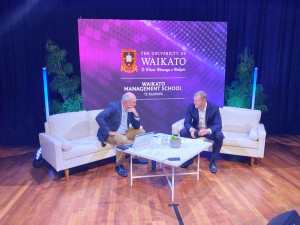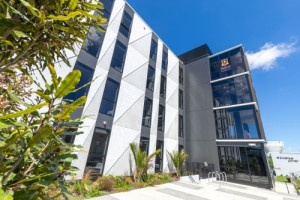Gap year reflections to University of Waikato graduate
Top student among his Bachelor of Business cohort, Rawiri Tonga graduates from the University of Waikato.
Read the latest news and headlines.

Newsroom, 12 February 2024
Reserve Bank Governor Adrian Orr's speech on Friday at the New Zealand Economics Forum hosted by the University of Waikato is likely to be closely scrutinised after surprising strength in employment data for the December quarter.
 The Post, 11 February 2024
The Post, 11 February 2024
Now in its fourth year, the University of Waikato 2024 New Zealand Economics Forum will bring together some of New Zealand's top economic thinkers, academics and policymakers at a time when the global economy remains hugely volatile.
 Newshub, 8 February 2024
Newshub, 8 February 2024
Concerns are growing New Zealand's ageing population and low fertility rates could cause major economic headaches in the years ahead. Distinguished Professor Emeritus Paul Spoonley joined the AM Show ahead of the 2024 New Zealand Economics Forum at the University of Waikato on 15-16 February.
 New Zealand Herald, Bay of Plenty Times, 6 February 2024
New Zealand Herald, Bay of Plenty Times, 6 February 2024
The new associate dean for the University of Waikato's Management School has his sights set on growing student numbers at the institute's Tauranga campus.
Hamilton 'well-poised' to cope with looming recession and storm fallout
Stuff, 20 February 2023
Hamilton is comparatively well-poised to bear up under a recession, as well as economic fallout from Cyclone Gabrielle and other events.
The holes in NZ’s ‘world-class’ public sector
Newsroom, 2 March 2023
The state of the country’s public sector was among the topics of discussion at the first day of the annual New Zealand Economics Forum on Thursday, hosted by the University of Waikato.
NZ Economics Forum to be hosted by UOW
Sunlive, 2 March 2023
The University of Waikato is hosting the annual New Zealand Economics Forum, which returns as an in-person event at its Hamilton Campus Thursday March 2 and Friday March 3 March.
What’s wrong with the public service?
Politik, 3 March 2023
Environment Minister David Parker yesterday fired Rob Campbell as chair of the Environment Protection Authority because Parker claimed he had breached the public service code of conduct over impartiality.
Can the rising tide of a 'taniwha' economy lift the boats of all Māori?
The Spinoff, 25 January 2022
The Māori economy is creating intergenerational wealth worth an estimated $70bn. Since 2012, Māori-owned assets have increased in value by 10% each year — much faster than the wider Aotearoa New Zealand economy.
What can we learn from countries already using open banking?
The Conversation, Radio New Zealand, 30 December 2022
Dr Abhishek Mukherjee and Associate Professor Paresha Sinha, both from Waikato Management School, co-authored an article about 'open banking', set to arrive in New Zealand by 2024.
Welcome to the hyper-ageing nation that is New Zealand
Stuff, 20 November 2022
New Zealand's towns and cities are becoming 'hyper-aged', according to population projections, which will have far-reaching consequences for our society and economy.
Young entrepreneur's death sparks media backlash
Mediawatch, Radio New Zealand, 12 December 2021
In a story about the pressures faced by founders of fast-growing start-ups, Dr Amanda Williamson, lecturer in innovation and strategy at Waikato Management School, said a problem of "surface acting" by entrepreneurs needs to be addressed.
Pre-Covid supply chains may never return to normal
Newsroom, 10 December 2021
The world's supply chains may never return to pre-pandemic 'normal' levels, experts have warned.
Professor of Economics Anna Strutt said the pandemic had brought "waves of supply shocks", with the proportion of ships arriving within eight hours of schedule cut in half, and the cost of shipping a box from China to the United States increasing tenfold.
An MBA for the people who are ready to step up
Stuff, 2 December 2021
A strong focus on experiential learning is what makes the Waikato MBA so distinctive, says programme director Professor Brad Jackson.
You’re currently viewing the website as a domestic student, you might want to change to international.
You're a domestic student if you are:
You're an International student if you are: